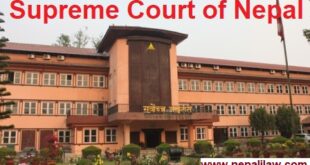The Judicial System of Nepal has believes in an independent, impartial, and competent judiciary and the concept of the rule of law, and establish a prosperous country. An independent judiciary, imaginative by the executive division of the government of Nepal.
Judicial System of Nepal developed by its own judicial system, custom, and practices, and it has own characteristics. Doctrinally, it is a mixed type of judicial systems practice in the worldwide Common and Roman law. Nepal has a written constitution, written statutes, laws, acts, and regulations like the Roman legal system. It has also practiced case laws/ precedent as the Common law system.
The Criminal Justice System of Nepal is following an Adversarial System. The adversarial system is a type of criminal justice system where the court role-plays as a referee between the prosecution and the defense. The Court only hears the case and gives its verdict as per laws and precedent.
In Nepal, there is an investigation authority to investigate the offense, where violates the penal law of the country. The government attorney or prosecutor files the charge sheet in the trial court and the accused has the right to the appointment of the defense lawyer/s.
Powers relating to justice in Nepal might be exercised by courts and other judicial bodies in accordance with the constitution of Nepal, other statutes, laws, regulations,s and the accepted principles of justice and established doctrine by the Supreme Court of Nepal.
According to the Constitution of Nepal (2015), the courts constitutes three levels;
- The Supreme Court,
- Appellate courts, and
- District courts
- Other Court/body
Specialized court: courts or tribunals might be constituted for the purpose of hearing special types of cases.
Judicial Body: judicial bodies might be constituted at the Local level to pursue cases under local government operation laws or other bodies as required might be formed to trail alternative dispute settlement or ADR methods.
Also read: Jurisdiction of the Judicial Committee of Local Government in Nepal
The Supreme Court
There is a Supreme Court (SC)[i] in Nepal. Supreme Court is the highest or supreme court of Nepal, is a court of record. Generally, all courts and judicial bodies under the Supreme Court. It has the final authority to interpret the Constitution of Nepal and preventive laws as the last resort of the country for searching for justice.
SC has authority for inspection, supervision, and give necessary direction to all subordinate courts, specialized courts, judicial bodies, and all other institutions that exercise judicial powers or quasi-judicial bodies in relation to matters relating to judicial administration or management. SC has both original and appellate jurisdiction.
Justice of Supreme Court: it comprises a maximum of twenty Judges in addition to the chief justice.
Jurisdiction of Supreme Court;
- Extraordinary Jurisdiction: the Supreme Court has an extra-ordinary power to declare the law, that law to be void either ab initio or from the date of its decision if any law appears to be so inconsistent with the constitution,
- Any law or any part thereof, declared void on the ground of inconsistency with this Constitution as imposed unreasonable restriction to enjoy any fundamental right,
- To be declared void because of contradiction of Federal law, provincial and municipal laws,
- Issue order to be enforced fundamental rights,
- Under the extra-ordinary jurisdiction, it might issue appropriate orders including the writs of habeas corpus, mandamus, certiorari, prohibition, and quo warranto.[ii]
All must abide by any interpretation of the Constitution or a law made by or any legal principle set out by the Supreme Court in the course of the trial of a lawsuit. Supreme Court can initiate proceedings and impose punishment for contempt of court if someone creates obstruction in the proceeding of justice by or disregard any court order or judgment or any of its subordinate courts.
The High Court
There is a High Court in each State, seven high courts established in each province, nine high court’s bench,es and two temporary high court benches under the high courts in Nepal. The high court also can initiate proceedings on and execute punishment for the court of contempt, as per Federal law, if anyone creates obstruction in the dispensation of justice and disregard any order or judgment.
The high court also exercises extraordinary jurisdiction according to article 144 of the constitution of Nepal. The High Court and its bench can issue suitable orders and writs including the writs of habeas corpus, mandamus, certiorari, prohibition, and quo warranto. It has the power to issue necessary and appropriate orders for the enforcement of fundamental rights and legal rights. It has ordinary jurisdiction and appellate jurisdiction.
District Court
There is District courts in every District, thus seventy-seven District courts exist in Nepal. The District court has the power to hear the appeal case of the Local level judicial bodies established in each local body. The Local level judicial committee is subordinate to the District Court.
The District court is the general trial court of criminal and civil cases with both government party and private party cases.
Conclusion
There is one special court for a special cases such as corruption under the Commission for the Investigation of Abuse of Authority (CIAA) and another case as per the decision of the Nepal government.
The one local judicial committee in each local boding led by vice-president and vice-mayor.
Reference
[i] Constitution of Nepal (2015), art. 126
[ii] Ibid arti. 133
 Nepali Law A complete legal information portal
Nepali Law A complete legal information portal


